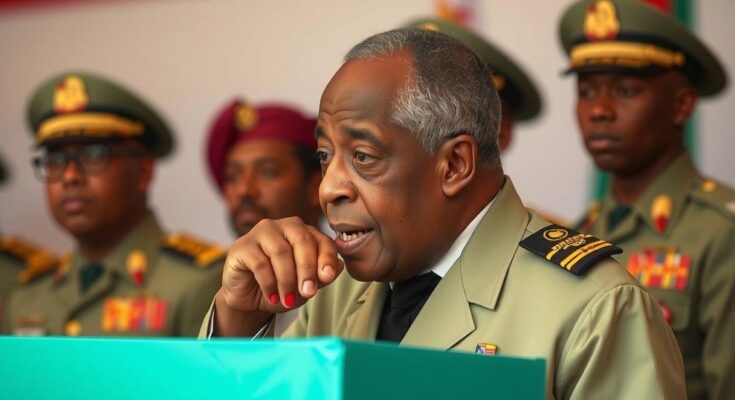Chad held a general election amid low turnout, following opposition calls for a boycott. The government views the election as pivotal for ending military rule, while the opposition claims results are pre-determined. Many voters expressed skepticism about the efficacy of their vote, highlighting ongoing socio-economic challenges and security threats in the region.
Chad conducted its general election on Sunday, marking a pivotal moment according to the authorities, who view the event as a step towards concluding military governance. Despite this significant political exercise, reports indicated a notably low voter turnout, estimated at just 38 percent, as opposition parties encouraged the populace to abstain from voting. The election aimed to fill positions in parliament, provincial assemblies, and local councils.
The Election Management Agency (ANGE) cited “cold weather” as a factor contributing to voter apathy, despite opposition claims of pre-determined results. Success Masra, the leader of the opposition Transformers party, asserted that most voters stayed home in response to the boycott. This boycott provides an advantage to candidates supporting President Mahamat Idriss Deby Itno, who assumed power via military intervention in 2021 and faced accusations of election fraud during his legitimization in May.
President Deby urged citizens on social media to vote, labeling it a “historic day”. However, the opposition remained skeptical, with Masra reporting that results were already programmed into computers before voting took place. Local dissatisfaction was echoed by voters like Herve Natouingan, who felt casting a ballot was futile given the perceived lack of real democracy, while others, such as Patrice Lumumba Deoumoundou, expressed hope for significant change through their vote.
The election protocol allowed soldiers, police, and nomadic populations to vote a day earlier, reportedly achieving high turnout rates of 72 percent and 54 percent, respectively. Meanwhile, concerns about election integrity arose, with claims from the Democratic Party of the Chadian People regarding missing ballots. This election context is further complicated by threats from Boko Haram and geopolitical tensions linked to Chad’s involvement in regional conflicts.
The Chad government presents these elections as crucial in its democratic transition following the long-standing leadership of Deby’s father, who governed for thirty years. With oversight from foreign observers and political representatives, the process moves towards solidifying governance amid ongoing challenges in the country and the broader Sahel region.
Chad is currently navigating a complex political environment after experiencing a military coup in 2021, which ended the three-decade rule of President Idriss Deby, who died in combat. The transitional government under President Mahamat Idriss Deby Itno has faced significant opposition, which accuses it of maintaining a facade of democracy while undermining electoral legitimacy. Widespread criticism from various sectors of society calls attention to ongoing socio-economic challenges, voter apathy, and concerns regarding security threats posed by militant groups in the region. The forthcoming elections are deemed essential by the ruling government to restore democratic practices, but the opposition contests their validity and integrity, leading to calls for public boycott.
The general election in Chad represents a critical moment in the country’s ongoing transition from military to civilian rule. With significant portions of the population choosing to boycott the election, skepticism about the legitimacy of the process remains high. President Deby seeks to solidify his authority amidst calls for substantial reforms and more democratic governance. The future of Chad hinges on the outcomes of these elections and the response from a populace disillusioned with past governance structures.
Original Source: www.myleaderpaper.com




